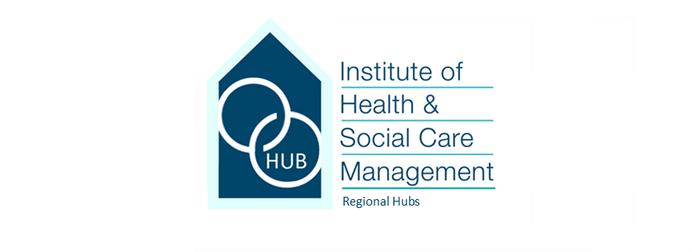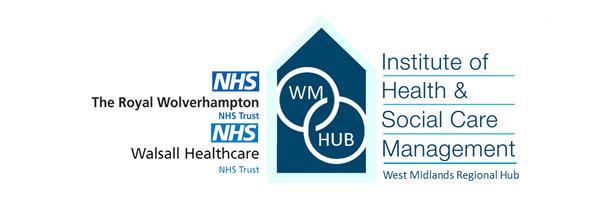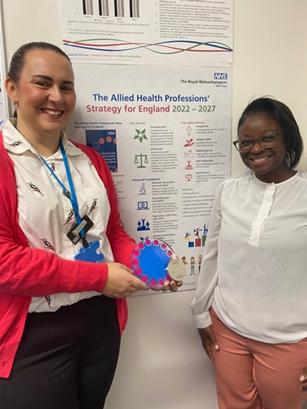
6 minute read
Orthotics: national award winners for sustainability
from HUB Magazine Issue 5
by IHMPublish
Trust : RWT
Author: Kate Pugh and Ndanatsei Mupawaenda
The Royal Wolverhampton NHS Trust’s orthotics department based at New Cross Hospital and Cannock Chase Hospital was the winner of the sustainability award at the Fab Change Festival in 2021 and more recently they were announced as the Chief Allied Health Professions Officer (CAHPO) Greener AHP winners in 2022. The department achieved this by embarking on a sustainability drive, where the team investigated how to improve the sustainability of the service without negatively impacting quality, patient care, and efficiency. In April 2021 the “greener orthotics” panel was created to discuss ideas and formulate a plan, examining how to reduce waste, improve processes, and recycle and to see if there were ways patients could access the service differently.




The panel comprised: Beagle Orthopaedics- The main supplier to our orthotics service, Janet Smith (Head of Sustainability at The Royal Wolverhampton NHS Trust), Dr Nicky Eddison (Orthotics Service Manager and now the Trust’s AHP Research Lead), Kate Pugh (Orthotics Clerk now a Project Support Administrator at the British Association of Prosthetists and Orthotists), and Ndanatsei Mupawaenda (Orthotics Clerk).
Meetings were held monthly and led to:
1. The implementation of telehealth, and the reduction of single-use plastics and packaging.



2. The introduction of biodegradable bags.
3. A reduction in deliveries and the introduction of once-aweek delivery service.
4. The introduction of a large reusable box instead of cardboard boxes for collections and deliveries.
5. The introduction of an electric vehicle for collections and deliveries.
6. The introduction of recycled paper, which was only used when necessary and the implementation of a service that printed and posted all letters externally on recycled paper. This was not only cost-effective but also gave the administrators more time to do other duties.
7. Triaging which was paper-based was changed to an electronic system along with electronic ward logs and goods posted out log.
8. Recycling bins were installed in the department.
9. AFOs were sent to developing countries to be used instead of disposed of.
The impact of those changes:
·151,913 miles of patient travel saved to and from the hospital. The equivalent of six times around the globe!



·A reduction of 5,621 car parking spaces
·A reduction of 28 tonnes of CO2emissions in the local area (It would take 14.7 hectares of forest a year to save 28 tonnes of CO2)
·0.1 Quality-adjusted life years saved


The department consists of 12 staff, and it took a team effort to achieve our goals. The outcome of this project is a prime example of how small departments and small changes can have a huge impact. The NHS hopes to reach NET ZERO directly by 2040 and indirectly by 2045.



A personal perspective
As an Orthotic Clerk to be given the opportunity to be part of an award-winning project felt very empowering and fulfilling. To be given the chance to see an idea come to life, present it, and be supported to make changes that benefit both the department and meet the greener NHS objectives helped improve team working within the department and open a new platform for the team to be able to present ideas and be more open about changes they felt would improve efficiency. To see and hear one’s voice being listened to really was and still is life-changing both at work and in home life as now it is a little easier to step out of our comfort zones.





The importance of leadership in the NHS: and the need to support our leaders


Trust:
RWT
Author: Dr Nicky Eddison, Charlotte Colesby, and Russell Hanks
Numerous reports have found a large-scale failure of management and leadership in the NHS, often with serious consequences. Thus, the need for effective leadership in healthcare has come under increasing scrutiny with research emphasising the importance of high-quality leadership in ensuring positive, innovative, and caring cultures. Leadership has multiple interpretations, it is rarely defined and explicit references are vague and unclear.


There are a plethora of opinions on what good leadership looks like and while there is much leadership training available, there is no standardised training for leaders in the NHS. There are many leadership theories, and each leader brings their own experience, skills, and personal characteristics alongside knowledge to their role. Where examples of excellent leadership are observed it is usually due to the endeavour of the individual as opposed to structured training and talent management. Although recent reports have offered recommendations to address this. The NHS has committed inordinate amounts of time and money in an attempt to change and re-structure. It was the Griffiths report in 1983 which was the catalyst for the introduction of general management in the NHS, accompanied by the famous quote “if Florence Nightingale were carrying her lamp through the corridors of the NHS today, she would most certainly be searching for the people in charge”.


Following the Langsley reforms and the introduction of the Health and Social Care Act 2012 alongside the promise to “direct more money to the front line” and purge it of bureaucracy, a reduction in NHS management was targeted. Between 2010-2017 the number of NHS managers fell by 18%.


Today, the NHS still has only 2% of its staff in senior leadership positions, significantly below the national workforce average of 9.5%. This has led to claims it is one of the most undermanaged organisations on the planet, despite evidence highlighting the positive impact management and leadership has on performance in healthcare.


It has been acknowledged that the allied health professions (AHPs) are in a prime position to effect change at every level of the NHS, with the encouragement to fill formal leadership positions alongside doctors and nurses. AHPs have demonstrated their capacity to rapidly transition from clinical positions to senior leadership roles. However, there is a dearth of exploration into the nature of these leadership journeys or how AHP leadership development and career progression might be supported. As a result, many AHPs may be ill-prepared for leadership positions.



The training and support a leader receives are vital because the role of a leader presents a range of challenges, often with no clear resolution. Leaders find themselves juggling an array of complex and wicked issues which they may not have faced previously. Thus, management is the equivalent of déjà vu (seen this before), whereas leadership is the equivalent of vu jàdé (never seen this before).
This NHS is currently facing an enormous leadership challenge. The recent NHS staff survey highlights the level of stress present in the workforce with 46.8% of staff stating they have felt unwell as a result of work-related stress. As a result, there is an ever-increasing catalogue of instructions on what managers and leaders must do to help mitigate the huge issues the health and care sector faces and improve the health and well-being of staff (see figure 1). It appears very little thought is directed at supporting the leaders tasked with this monumental challenge. Consequently, leaders can often find themselves facing problems alone, believing the false narrative that a leader must be a panacea for all work-related issues and the old adage that ‘it’s lonely at the top’.




Figure 1: Eight key workplace factors that will have an impact on the wellbeing
Support for AHP service managers



In an attempt to create a network of support for AHP service managers, in 2021 the authors of this article formed a support group. The AHP service management support group provides an opportunity for AHP service managers to meet on a regular (quarterly) basis, to discuss any issues they might be facing and have the opportunity to reach out to leaders in similar positions to share their experiences and discuss solutions.
Specific aims of the group include:
To share ideas and solutions
To learn from each other
To share evaluation and outcomes

To discuss evidence-based practice and practice-based evidence to support decision making


To identify blockers and potential solutions
To provide peer supervision
To provide updates on courses and training available
To invite key stakeholders to deliver presentations
·To allow staff new in post access to experienced service leads

An important element of the support group is peer supervision, which can be defined as “Supervision and consultation in individual or group format, for the purposes of professional development and support in practice…includes a critically reflective focus on the practitioner’s own practice”.
Peer supervision differs from clinical supervision in that it does not require the presence of a more experienced, qualified, or senior colleague. Research has shown that effective peer supervision can have benefits for both the organisation and the individual, including a reduction in stress and anxiety, an increase in job satisfaction, and staff retention. Furthermore, the Health and Care Professions Council (HCPC) with whom all AHPs must be registered in order to practice, support the case that registrants should be participating in supervision as part of their practice where possible18 and state in their standards of proficiency that registrants must “understand the importance of participation in training, supervision, and mentoring”.



Peer supervision for members of the AHP service management support group is optional and occurs after the main meeting. It provides a confidential and supportive environment to share and discuss issues members are facing, providing the opportunity for feedback, reflection, and shared experience.


Staff who have attended the meetings have provided positive feedback
If you are an AHP service lead at The Royal Wolverhampton NHS Trust or Walsall Healthcare NHS Trust and you would like more information about the AHP service management support group, please contact the authors of this article at: N.Eddison@nhs.net, charlotte.colesby1@nhs.net, and russell.hanks@nhs.net.




